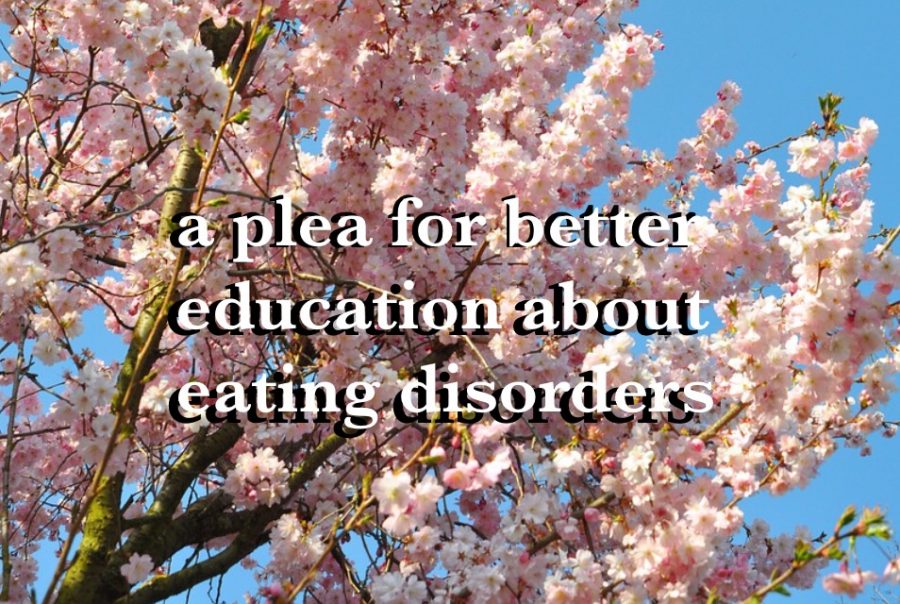Out of the five people who defined bulimia, three had incorrect meanings: Are schools teaching enough about eating disorders?
Photo via https://www.google.com/url?sa=i&url=https%3A%2F%2Fwww.needpix.com%2Fphoto%2F906061%2Falmond-blossom-aesthetic-flowers-pink&psig=AOvVaw1oGEPZ9tV3Orgdefa5mD2x&ust=1579019554879000&source=images&cd=vfe&ved=0CAMQjB1qFwoTCIjcseb4hecCFQAAAAAdAAAAABAD under the Creative Commons License
Jan 15, 2020
Destructive and harmful, eating disorders impact student life. Therefore eating disorders and coping mechanisms should be taught. However, some students believe middle schools are not teaching enough.
Although four out of nine of the students surveyed believe they are teaching enough in health class and the other percentage believes the opposite, it is apparent how most students don’t know the correct meaning of these illnesses. One student says, “Yes, they teach us about what eating disorders are, and what can happen to the people that have them.” The same student also wasn’t able to list the proper definition of bulimia, illustrating the opposite of what they said beforehand. Schools don’t teach enough if multiple students don’t even know the correct meanings. Out of the five people who defined bulimia, three of them had wrong meanings. One student described bulimia as “gaining weight”, while another claims it is “eating a lot at once”.
Along with students not knowing meanings, one student believes they don’t teach a variety. “They don’t talk about EDNOS or that much about any eating disorder in general. They worry more about being healthy and fit, which can cause compulsive behaviors leading to an eating disorder,” they explain. One student comments how health teachers “need to teach it from the point of view of a person WITH a disorder.”
Despite the lack of knowledge on the topic, 100% of the students believe eating disorders are important to learn. Various research suggests health teachers should be teaching a great deal of eating disorders and coping mechanisms. Fifty three percent of American girls report they are unsatisfied with their bodies at the young age of thirteen. Seventy eight percent report they are unsatisfied at the age of seventeen. Eating disorders often stem from body image. If such a great percentage is unsatisfied with their bodies, shouldn’t schools present students with coping mechanisms?
Eating disorders have the highest mortality rate of any mental illness. Eating disorders are impactful, and destructive. “An eating disorder can affect someone’s life in many ways. Someone’s grades could drop due to the lack of attention in class, when having an eating disorder,” one student comments.
Four out of ten people have directly experienced an eating disorder or know someone who has. It affects so much of the world negatively, but still students aren’t learning enough. Six out of seven people claimed that health teachers don’t teach coping mechanisms, while the other person simply claimed they “don’t know”.
Coping mechanisms should be provided. Simply learning about eating disorders, won’t help someone who is suffering from body image issues. Although people with eating disorders should seek professional help, they might be too ashamed or embarrassed. Health teachers should provide, at least some, coping mechanisms, while still encouraging struggling students to get professional help.
Although health teachers are an important part of education, it most likely isn’t their fault that these students don’t have much information on eating disorders. Health teachers are required to enforce many lessons, but only have one quarter of the school year to do so. They also might not be required to teach in depth about the topic. Not one person is completely at fault. The country as a whole is responsible for providing the youth with a better education about eating disorders in order to get students the help they need before it becomes a serious problem.
CORRECT DEFINITIONS OF EATING DISORDER :
anorexia nervosa : when one has an intense fear of gaining weight or appearing overweight, and as a result restrict their eating
body dysmorphic disorder : a mental disorder characterized by the obsessive idea that their body is flawed, they don’t see their body for what it is
bulimia nervosa : an emotional disorder involving distortion of body image and an obsessive desire to lose weight, in which bouts of extreme overeating are followed by depression and self-induced vomiting, purging, or fasting
ednos: refers to eating disorders that display some of the characteristics of other disorders, such as anorexia nervosa or bulimia nervosa, but the behaviours of which do not fit the full criteria of these conditions






Lila Ulmer • Jan 16, 2020 at 10:01 am
The health teachers need to see this!